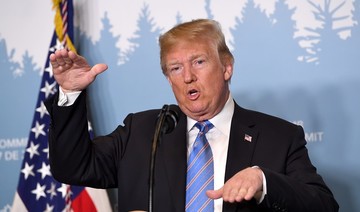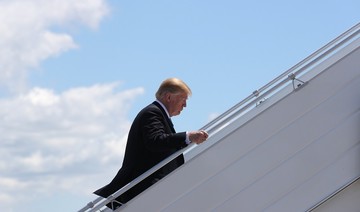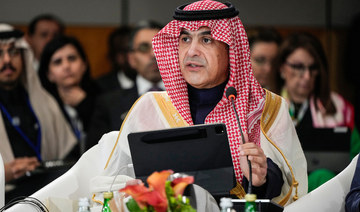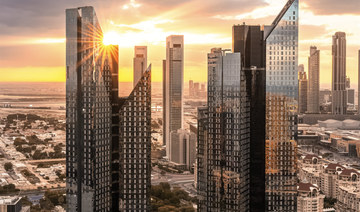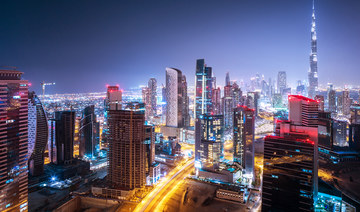WASHINGTON: Vowing to cut US trade deficits and protect the nation’s high-tech “crown jewels,” President Donald Trump said Friday he’s levying a 25 percent tariff on up to $50 billion worth of Chinese imports, instantly escalating a trade dispute between the world’s two largest economies.
China’s government quickly responded that it would “fight back strongly” with penalties of the same scale on American goods.
Trump said he was fulfilling a campaign pledge to crack down on what he contends are China’s unfair trade practices and efforts to undermine US technology and intellectual property. During an impromptu appearance on the White House North Lawn, the president hailed his “very big tariffs” on China.
“You know we have the great brain power in Silicon Valley, and China and others steal those secrets. And we’re going to protect those secrets. Those are crown jewels for this country,” Trump said on “Fox & Friends.”
Asked about inciting a trade war, he said, “There is no trade war. They’ve taken so much” already.
The US tariffs will cover 1,102 Chinese product lines worth about $50 billion a year. Those include 818 products, worth $34 billion a year, remaining from a list of 1,333 the administration released in April. After receiving public comment, the US removed from the list hundreds of products, including televisions and some pharmaceuticals, according to a senior administration official who briefed reporters on condition of anonymity.
The government will start to collect the tariffs July 6.
The administration also is targeting an additional 284 Chinese products, which it says benefit from China’s aggressive industrial policies, worth $16 billion a year, but won’t impose those tariffs until it collects public comment. US companies that rely on the targeted imports — and can’t find substitutes — can apply for exemptions from the tariffs.
“It’s thorough. It’s moderate. It’s appropriate,” US Trade Rep. Robert Lighthizer said Friday on Fox Business Network’s “Mornings With Maria.” Lighthizer added: “Our hope is that it doesn’t lead to a rash reaction from China.”
“The Chinese side doesn’t want to fight a trade war, but facing the shortsightedness of the US side, China has to fight back strongly,” the Chinese Commerce Ministry said in a statement. “We will immediately introduce the same scale and equal taxation measures, and all economic and trade achievements reached by the two sides will be invalidated.”
The Commerce Ministry said it also is scrapping deals made with Washington in talks aimed at defusing a sprawling trade dispute.
A ministry statement gave no details of what US goods would be affected, but China announced possible targets in April including soybeans, light aircraft, orange juice, whiskey and beef.
Trump has already put tariffs on steel and aluminum imports from Canada, Mexico and European allies, and his proposed tariffs against China risk a major trade war involving the world’s two biggest economies.
Trump’s decision comes in the aftermath of his summit with North Korean leader Kim Jong Un. The president has coordinated closely with China on efforts to get Pyongyang to eliminate its nuclear arsenal. But he signaled that whatever the implications for that or other issues, “I have to do what I have to do” to address the trade imbalance.
The administration is also working on proposed Chinese investment restrictions by June 30.
The US tariffs are a response to China’s aggressive attempts to challenge US technological dominance, including outright theft of trade secrets and forcing US companies to share technology in exchange for access to the Chinese market. Those tactics are “a dagger aimed at the future of the US manufacturing sector,” the senior administration official said.
Wall Street has viewed the escalating trade tensions with wariness, fearful that they could strangle economic growth and undermine the benefits of the tax cuts Trump signed into law last year.
“Imposing tariffs places the cost of China’s unfair trade practices squarely on the shoulders of American consumers, manufacturers, farmers, and ranchers,” said Thomas Donohue, president of the US Chamber of Commerce. “This is not the right approach.”
Reactions to the tariffs cut across party lines. Senate Minority Leader Chuck Schumer, D-N.Y., said Trump is “right on target.”
“The president’s actions on China are on the money. China is our real trade enemy, and their theft of intellectual property and their refusal to let our companies compete fairly threatens millions of future American jobs,” Schumer said.
Meanwhile, Rep. Dave Reichert, R-Washington, said he disagreed with the action because “Americans will bear the brunt instead of China.”
AP Writers Kevin Freking and Martin Crutsinger contributed to this story.
Trump announces US tariffs on $50 billion in Chinese imports
Trump announces US tariffs on $50 billion in Chinese imports

- Trump has long vowed to fulfill his campaign pledge to clamp down on what he considers unfair Chinese trading practices.
- If the president presses forward as expected, it could set the stage for a series of trade actions against China and lead to retaliation from Beijing.
SFD, AfDB sign deal to finance development initiatives in Africa
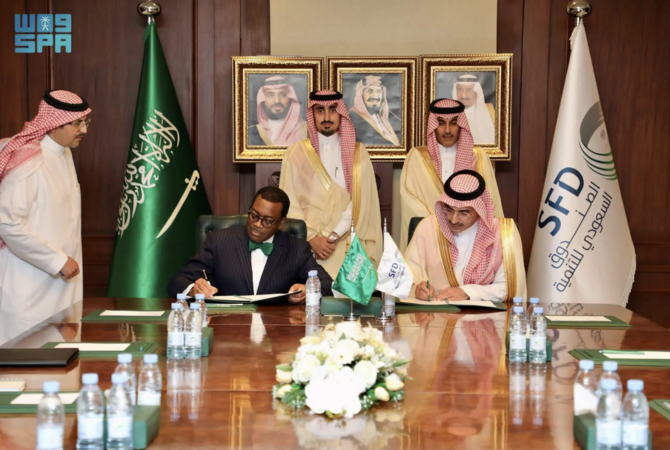
RIYADH: Developing African countries are poised to receive a funding boost for growth initiatives following a deal with the Saudi Fund for Development, aiming to foster sustainable progress.
The memorandum of understanding, signed with the African Development Bank Group, aims to promote mutual objectives and activities for sustainable international development between the two parties, the Saudi Press Agency reported.
This initiative aligns with SFD’s objective to enhance both social and economic growth by creating diverse opportunities.
Moreover, the newly signed agreement aims to facilitate the exchange of knowledge and experiences while advocating for optimal co-financing strategies. It will also support the attainment of sustainable development goals and optimize the impact of these initiatives.
Additionally, the MoU also aims to enhance collaboration in pursuit of shared goals that promote the expansion of crucial opportunities in diverse beneficiary African nations, ultimately contributing to global prosperity for the most impoverished and least developed communities.
Saudi Central Bank and BIS co-host meeting on reserve management in Riyadh
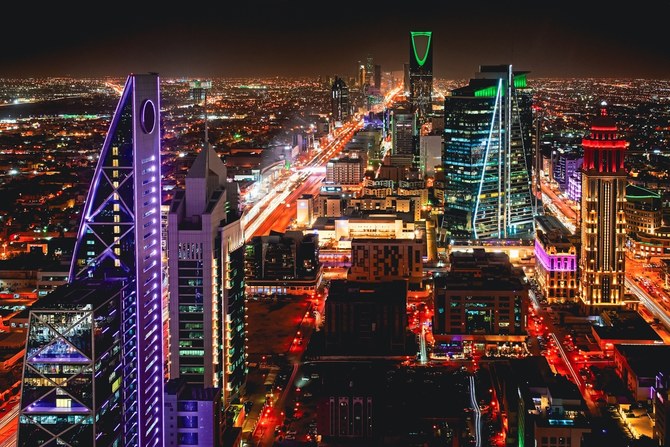
RIYADH: The evolving global landscape presents new challenges and opportunities for central bank reserve managers, the governor of Saudi Arabia’s apex financial institution explained at a high-level meeting.
Speaking at an event in Riyadh which was attended by the Bank for International Settlements, Ayman Al-Sayari set out his view on the complexities of the current macro-financial environment.
The two-day gathering, which began on April 28, brought together reserve managers and experts from central banks in the Middle East and North Africa region, as well as participants from other apex financial institutions, to discuss the latest trends in managing foreign exchange reserves.
The event served as a platform for participants to exchange insights, perspectives and expertise on the most critical aspects of reserve management through a series of panel discussions and keynote speeches.
In March, SAMA’s monthly statistics bulletin revealed that foreign assets of Saudi Arabia’s commercial banks surged by 22 percent in February, reaching a total of SR347.63 billion ($92.7 billion) compared to the same month of the previous year.
This rise reflects a significant expansion in the commercial institutions’ international holdings and investments.
The central bank added that its net foreign assets reached SR1.55 trillion in February.
Central banks’ foreign holdings are primarily for reserve management and monetary policy purposes, while commercial banks’ foreign assets are for business operations, customer services, and investment activities.
The report added that Saudi Arabia’s total reserve holdings amounted to SR1.62 trillion, representing a five percent decline compared to the same month of 2023.
DIFC records $2.6bn in gross written premiums, highest figure in its 20-year history
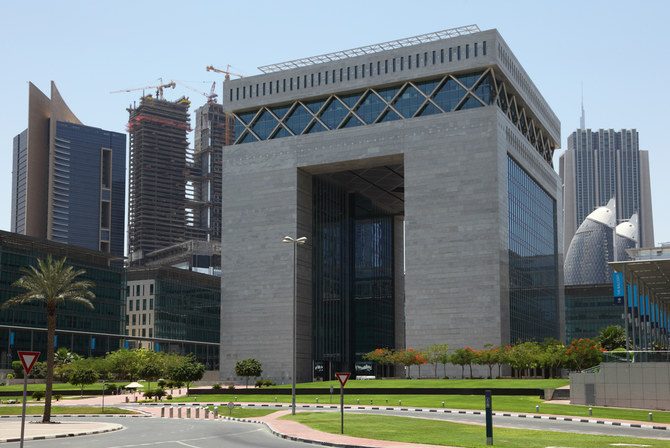
RIYADH: Dubai International Financial Centre recorded its highest gross written premiums in its 20-year history, amounting to $2.6 billion in 2023, marking a 23 percent increase from the previous year.
DIFC, a global financial center in the Middle East, Africa, and South Asia region, connects the fast-growing markets of the region with global economies and offers dining, retail, and living amenities, according to its website.
The center also recorded a 20 percent increase in the registration of insurance and reinsurance firms, including the first move of a Guernsey-based captive.
The Emirates News Agency reported that DIFC “has consolidated its position as the principal hub for the (re)insurance industry,” adding that DIFC’s appeal for managing general agents, representing 43 percent of new registrations, is a major factor shaping its insurance landscape.
This is credited to the center’s well-established regulatory framework, facilitating partnerships with cedants and brokers.
The influx of global insurers, reinsurers, and brokers, as well as captives, MGAs, and other industry stakeholders into DIFC, is driven by several factors. These include buoyant oil prices and increased infrastructure spending, as well as a focus on sustainable projects and low insurance penetration in the region.
Among the notable entities to join DIFC’s insurance sector in the past year are Alif Limited, Arc Insurance and Reinsurance Limited, and Barents Risk Management Limited. Joining them are BharatRe Global Ltd. and many more, it added.
Arif Amiri, CEO of DIFC Authority, emphasized the center’s role as a global industry hub, hosting over 120 registered insurers, reinsurers, captives, MGAs, and related entities.
The significance of DIFC’s stature in the insurance domain is further underscored by its co-hosting of the Dubai World Insurance Congress, featuring discussions on key themes reshaping the industry’s future, including innovation, capital attraction, and talent development.
In 2023, a survey conducted at DWIC revealed an 87 percent confidence in the Middle East, Africa, and Southern Asia market’s strategic opportunities. Property, health, energy, cyber, and liability lines of business were identified as holding the most potential. The survey also highlighted an 85 percent confidence rate in renewals and client retention.
Over two decades, DIFC has fostered the growth of the insurance and reinsurance industry, attracting talent and expertise to access key markets in the Middle East, Asia, and Africa.
The center hosts major insurance brokers, five of which are top ranked by the specialized insurance credit rating agency, AM Best. This has contributed to a significant 61 percent increase in brokered premiums compared to 2022, surpassing the $2 billion mark and solidifying DIFC’s position as a global market for insurance and reinsurance placements.
Dubai Real Estate Brokers Program attracts 25 strategic partnerships
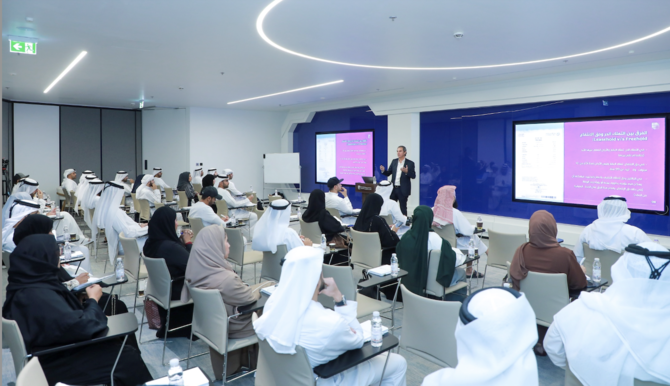
RIYADH: Dubai’s property market is set to grow, with the Real Estate Brokers Program securing 25 partnerships with brokerage companies and developers in the private sector.
According to a press statement, the first phase of the program, launched in mid-March and headed by the Dubai Land Department, also received over 1,000 registrations from Emirati citizens.
Dubai Real Estate Brokers Program aims to increase the proportion of citizen brokers from 5 percent to 15 percent over the next three years to enhance the participation of young citizens in the Emirate’s developmental initiatives across various key sectors.
“This reflects the early positive impact of the program, showcasing citizens’ aspirations and eagerness to engage as real estate brokers and acknowledging the pivotal role of Dubai’s real estate sector locally and globally,” said Marwan bin Ghalita, acting director general of Dubai Land Department.
The initiative also aligns with Dubai Social Agenda 33, which seeks to triple the number of Emiratis working in the private sector.
Ghalita added that the program will help young talents in the nation enhance their productivity, therefore contributing to Dubai’s economic growth.
“Dubai consistently offers outstanding examples of collaboration and synergy between the private and public sectors,” said Ghalita.
He added: “With the program’s enrollment exceeding 1,000 citizens and real estate companies continuing to join the strategic alliance within a short period, we are diligently working toward achieving all the ambitious goals of the Dubai Real Estate Brokers Programme. In particular, Emirati real estate brokers will increase from 5 percent to 15 percent over the next three years.”
The program also encompasses additional initiatives, including Emirati real estate broker licensing, encouraging property developers to allocate a portion of their sales to local agents, and empowering citizens in the property sector.
Under the partnership with the private sector, citizen participants will receive various support packages to enhance the competitive edge of UAE people and enable them to take up roles in the real estate sector.
The press statement added that efforts would also be made to allocate 10 percent to 15 percent of the development company’s sales to be marketed by Emirati real estate brokers, therefore contributing to the empowerment of national citizens by offering them employment opportunities in the property market.
Dubai ruler approves new $35bn airport terminal
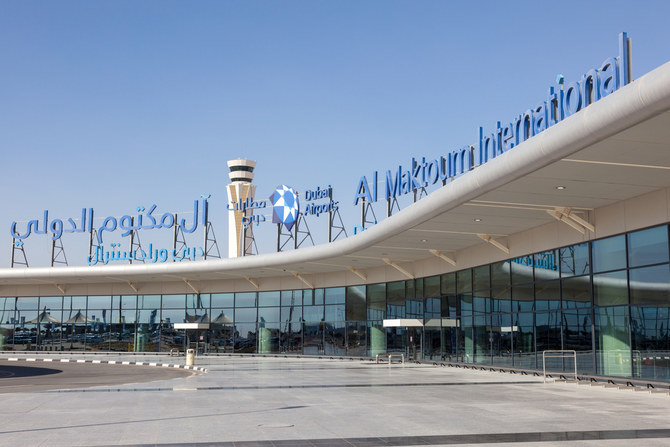
CAIRO: Dubai’s ruler Sheikh Mohammed bin Rashid Al-Maktoum approved a new passenger terminal in Al Maktoum International airport worth 128 billion dirhams ($34.85 billion), he said on Sunday in a post on X.
The Al Maktoum International Airport will be the largest in the world with a capacity of up to 260 million passengers, and five times the size of Dubai International Airport, he added, saying that all operations at Dubai airport would be transferred to Al Maktoum in the coming years.
The Al Maktoum airport will also include 400 terminal gates and five runways, he said.
The airport will be the new home of flagship carrier Emirates and its sister low-cost airline Flydubai along with all airline partners connecting the world to and from Dubai, Dubai state-owned airline Emirates chairman Sheikh Ahmed bin Saeed Al-Maktoum said.
The move “further solidifies Dubai’s position as a leading aviation hub on the world stage,” the CEO of Dubai Airports, Paul Griffiths, was quoted as saying by the Dubai Media Office.


